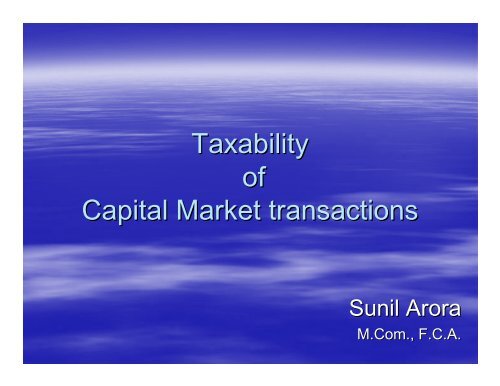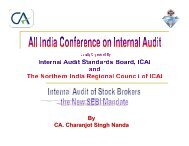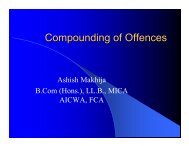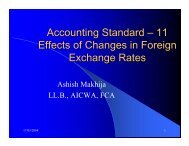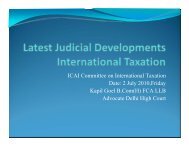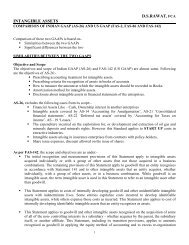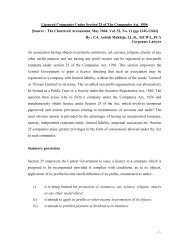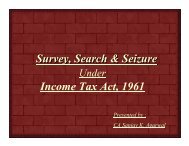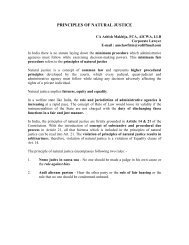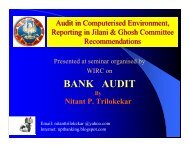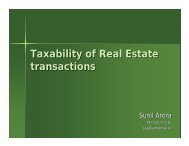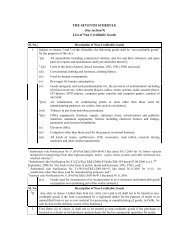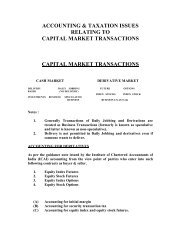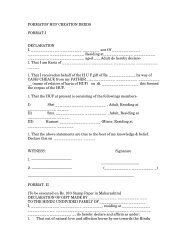Taxability of Share Market Transactions
Taxability of Share Market Transactions
Taxability of Share Market Transactions
Create successful ePaper yourself
Turn your PDF publications into a flip-book with our unique Google optimized e-Paper software.
<strong>Taxability</strong><br />
<strong>of</strong><br />
Capital <strong>Market</strong> transactions<br />
Sunil Arora<br />
M.Com., ., F.C.A.
Income from capital market<br />
<strong>Share</strong>s<br />
Business<br />
Investment<br />
Trading Speculation Capital gains<br />
Taxable at normal<br />
rates<br />
Section 43(5)<br />
Short / long term<br />
STT u/s 88E STT u/s 88E Exemptions / tax rates<br />
Treatment <strong>of</strong> loss
Statutory provisions<br />
• Business<br />
• F&O<br />
• STT<br />
• Dividend<br />
• Expenditure for earning dividend
Securities Transaction Tax<br />
Section 88E<br />
• Income from taxable securities transactions<br />
chargeable to tax under the head ‘Pr<strong>of</strong>it &<br />
gains from business & pr<strong>of</strong>ession’<br />
• STT allowed as a deduction from tax<br />
payable on such income<br />
• Tax payable on such income to be<br />
calculated by applying average rate <strong>of</strong><br />
income tax on such income
Effect <strong>of</strong> Section 88E<br />
• Scheme beneficial for assessees in higher<br />
tax bracket<br />
• No deduction in case <strong>of</strong> loss or income<br />
below taxable limits<br />
• Loss <strong>of</strong> STT paid:<br />
Income from taxable securities: Rs5.00 lacs<br />
STT paid : Rs3.00 lacs<br />
Average rate <strong>of</strong> tax : 25%<br />
Rebate <strong>of</strong> STT restricted to : Rs1.25 lacs
Speculative transaction<br />
• What is a speculative transaction<br />
• How it constitutes a separate business<br />
• <strong>Taxability</strong> <strong>of</strong> gain<br />
• Treatment <strong>of</strong> loss<br />
• STT
Speculative transactions<br />
• Section 43(5): “Speculative transaction” means a<br />
transaction in which a contract for purchase or<br />
sale <strong>of</strong> commodity, including stocks and shares, is<br />
periodically or ultimately settled otherwise than by<br />
the actual delivery or transfer <strong>of</strong> the commodity or<br />
scrips<br />
• Unless the transaction settled by actual delivery or<br />
transfer, it will be a speculative transaction.<br />
Jute Investment Co. AIR 1980 SC 483<br />
• Transaction speculative for the purpose <strong>of</strong> section<br />
43(5) even if intention to take actual delivery could<br />
not be effectuated<br />
M.R. Dhawan v. CIT (1979) 119 ITR 412 (Delhi)
Speculative transactions<br />
• Exceptions provided by the proviso:<br />
– A contract in respect <strong>of</strong> RM or merchandise to safe<br />
guard from loss due to future price fluctuations in<br />
respect <strong>of</strong> actual delivery<br />
– A contract in respect <strong>of</strong> stocks & shares entered into by<br />
a dealer or investor to guard against loss in holding <strong>of</strong><br />
stocks & shares<br />
– A contract entered into by a member <strong>of</strong> a forward<br />
market or a stock exchange in the course <strong>of</strong> any<br />
transaction in the nature <strong>of</strong> jobbing or arbitrage to guard<br />
against loss in the ordinary course <strong>of</strong> his business
Speculative transactions<br />
Proviso (d) inserted by F.Act, , 2005 wef 1-4-2006<br />
• Trading in derivatives not a speculative transaction:<br />
– Derivatives referred to in section 2(ac) <strong>of</strong> the Securities Contracts<br />
(Regulation) Act,1956<br />
– carried out in a recognised stock exchange<br />
– electronically on a screen based system<br />
– through a broker or a sub-broker broker registered u/s 12 <strong>of</strong> SEBI<br />
– supported by a time stamped contract note<br />
– containing client identity no. & PAN no.<br />
• Treatment <strong>of</strong> unabsorbed brought forward loss from trading<br />
in derivatives?
Treatment <strong>of</strong> speculation loss<br />
Section 73<br />
• Loss from speculation business can be set<br />
<strong>of</strong>f against pr<strong>of</strong>its & gains <strong>of</strong> another<br />
speculation business<br />
• Unabsorbed loss can be carried forward for<br />
maximum upto 4 AY succeeding the year <strong>of</strong><br />
loss
Speculation business<br />
• Explanation 2 to Section 28: : Where speculative<br />
transaction carried on by an assessee are <strong>of</strong> such<br />
a nature as to constitute a business, the business<br />
shall be deemed to be distinct and separate from<br />
any other business.<br />
• <strong>Share</strong> broker carrying out self trading <strong>of</strong> the nature<br />
<strong>of</strong> speculative transactions?<br />
• Manufacturing company carrying on trading <strong>of</strong><br />
shares <strong>of</strong> other companies?
Speculation business<br />
Explanation to section 73<br />
• Business <strong>of</strong> a company consists <strong>of</strong> purchase & sale <strong>of</strong> shares <strong>of</strong> other o<br />
companies:<br />
– For the purpose <strong>of</strong> set <strong>of</strong>f and carry forward <strong>of</strong> loss<br />
– Deemed to be carrying speculation business to the extent <strong>of</strong> such business<br />
<strong>of</strong> purchase & sale <strong>of</strong> shares<br />
• Exceptions :<br />
– Companies whose gross total income consists mainly <strong>of</strong> income<br />
chargeable under the head “Interest on securities”, “Income from house<br />
property”, “Capital gains” & “Income from other sources”<br />
– Companies carrying on banking business or granting <strong>of</strong> loans & advances
Explanation to section 73<br />
Implication<br />
• Applies only to companies<br />
• Loss from trading in shares cannot be set <strong>of</strong>f<br />
against income from other business &<br />
pr<strong>of</strong>ession
<strong>Share</strong>s held as capital asset<br />
• Period <strong>of</strong> holding<br />
• Exemptions<br />
• Rates <strong>of</strong> taxes<br />
• Special provisions
Long term capital asset<br />
• Held for more than 12 months in the case <strong>of</strong>:<br />
– <strong>Share</strong>s held in a company<br />
– Securities listed in a recognised stock exchange in India<br />
– Units <strong>of</strong> UTI<br />
– Units <strong>of</strong> a mutual fund specified u/s 10(23D)<br />
– Zero coupon bonds<br />
• Period to be considered from date <strong>of</strong> allotment for:<br />
– <strong>Share</strong>s<br />
– Rights issue<br />
– Bonus shares<br />
• For right to subscribe from the date <strong>of</strong> <strong>of</strong>fer<br />
• Date <strong>of</strong> broker’s s note in case acquired from stock exchange<br />
• In case <strong>of</strong> several lots FIFO to be followed: Circular No. 704 dt 28-4-95
Equity shares<br />
Section 10 (36)<br />
• BSE 500 index<br />
• <strong>Share</strong>s acquired between 1-3-20031<br />
&<br />
29-2-2004<br />
2004<br />
• Transferred after 12 months through a recognised<br />
stock exchange<br />
• Capital gains not chargeable to tax<br />
• Exemption has become redundant after<br />
introduction <strong>of</strong> section 10 (38)
Equity shares<br />
Section 10(38)<br />
• Long term capital gains arising from:<br />
– Equity shares in a company<br />
– Units <strong>of</strong> an equity oriented fund<br />
• Exempt from tax, provided transaction <strong>of</strong> sale is entered<br />
into after the date <strong>of</strong> application <strong>of</strong> chapter VII. (1-10<br />
10-2004)<br />
• STT has been paid on the said transaction<br />
• Exemption available to all assessee<br />
• Long term capital asset<br />
• Similar conditions for short term capital assets for reduced<br />
rate <strong>of</strong> tax <strong>of</strong> 10% u/s 111A
Capital gains exempt from tax<br />
• Capital gains not chargeable to tax by virtue<br />
<strong>of</strong> section 10 <strong>of</strong> the Act. In case assets are<br />
transferred at a loss?<br />
CIT v. S.S. Thiagarjan 129 ITR 115 (Mad.)<br />
Ramjilal Rais v. CIT 58 ITR 181 (All.)
Rate <strong>of</strong> tax on LTCG<br />
Section 112<br />
• Tax @ 20%<br />
• Proviso for tax to be restricted to 10% without<br />
indexation benefit in case <strong>of</strong> listed securities, etc<br />
• Unutilised exemption limit can be availed<br />
• No deduction under Chapter VIA<br />
• No rebate u/s 88<br />
• Rebate u/s 88B & 88C are allowed from the tax
Tax on short term capital gains from<br />
shares, etc<br />
Section 111A<br />
• Tax @ 10% on short term capital gains <strong>of</strong>:<br />
– Equity shares<br />
– Units <strong>of</strong> an equity oriented funds<br />
• Reduced rate only in case STT paid on the trf <strong>of</strong><br />
such shares<br />
• Unutilised basic exemption limit can be availed<br />
• No deduction under Chapter VIA<br />
• No rebate u/s 88<br />
• Rebate u/s 88B & 88C are allowed from the tax
Cost <strong>of</strong> acquisition <strong>of</strong> shares<br />
Section 55<br />
• Cost <strong>of</strong> acquisition <strong>of</strong> shares:<br />
– Rights issue<br />
– Bonus shares<br />
– Rights renounced<br />
– Acquisition <strong>of</strong> right renounced and subscription<br />
to the rights issue
Special provisions<br />
Section 94 (1),(2) & (3)<br />
• Provisions to curb tax avoidance<br />
– Securities sold and then repurchased<br />
– Beneficial interest in securities transferred during the yr<br />
• Applicable to business as well as capital assets<br />
• Provisions not applicable, in case:<br />
– There is no avoidance <strong>of</strong> income tax or<br />
– That the avoidance was exceptional & not systematic<br />
with no such avoidance in the previous 3 yrs
Loss in dividend stripping<br />
transactions<br />
Section 94 (7)<br />
• Securities/ units acquired within 3 months prior to<br />
the record date<br />
• Such securities sold with in 3 months after such<br />
date or<br />
• Units sold with in 9 months after such date<br />
• Dividend or income received is exempt<br />
• Loss arising from the transaction to the extent <strong>of</strong><br />
dividend to be ignored<br />
• Term “securities” to include stocks & shares
Loss / bonus shares<br />
Section 94 (8)<br />
• Units acquired with in 3 months prior to the record date<br />
• Bonus/ additional units allotted without any payment<br />
• Original units sold with in a period <strong>of</strong> 9 months without<br />
bonus/ additional units<br />
• Loss to be ignored for the purpose <strong>of</strong> computing income<br />
chargeable to tax<br />
• Loss deemed to be cost <strong>of</strong> acquisition <strong>of</strong> the additional/<br />
bonus units<br />
• Applicable to units <strong>of</strong> a mutual fund specified u/s 10 (23D)
Implication<br />
• 1000 <strong>Share</strong>s purchased @ Rs 30 each for Rs<br />
30,000/= in Feb, 2005.<br />
• In April, 2006 company issues bonus shares in the<br />
ratio <strong>of</strong> 1:1<br />
• In June, 2006 the entire 2000 shares are sold @<br />
Rs 15 each for Rs 30,000<br />
• Calculation <strong>of</strong> capital gain/ loss:<br />
– Long term capital loss : Rs 15,000/=<br />
– Short term capital gain : Rs 15,000/=
Short term capital gains<br />
• The assessee sells a plot <strong>of</strong> land for Rs 1.4 Cr which was<br />
acquired for Rs 1.0 Cr resulting in short term capital gains<br />
from sale <strong>of</strong> property Rs 40 lacs.<br />
• 1 lac shares <strong>of</strong> Rs 10 each subscribed in a pvt ltd company<br />
at a premium <strong>of</strong> Rs 50 each<br />
• The said pvt ltd company issues bonus shares 1:5<br />
• Original 1 lac shares are now sold for Rs 10 each resulting<br />
in short term capital loss <strong>of</strong> Rs 50 lacs<br />
• Whether gain <strong>of</strong> Rs 40 lacs above be <strong>of</strong>fset against loss <strong>of</strong><br />
Rs 50 lacs<br />
• Ensure to be out <strong>of</strong> section 94(8)
Capital Gains/ Business<br />
Income<br />
Sunil Arora<br />
M.Com., ., F.C.A.
Business<br />
Section 2(13)<br />
• Business includes any trade, commerce or any adventure or<br />
concerning the nature <strong>of</strong> trade, commerce or manufacture;<br />
• The word Business is one <strong>of</strong> wide import and it means an activity<br />
carried on continuously and systematically by a person by the<br />
application <strong>of</strong> his labour or skill with a view to earning an income.<br />
Barendera Prasad v. I.T. Officer AIR 1981 SC 1047,1953.<br />
• The concept business must potulate continuity <strong>of</strong> transactions. A<br />
single transaction <strong>of</strong> storage for sale does not constitute a business.<br />
R.P.Gupta v. State <strong>of</strong> Orissa AIR 1967 Ori 29,30
Capital Asset<br />
Capital asset means property <strong>of</strong> any kind held by an<br />
assessee,whether or not connected with his business or<br />
pr<strong>of</strong>ession, but does not include-<br />
• Any stock in trade, consumable stores or raw materials<br />
held for the purposes <strong>of</strong> his business or pr<strong>of</strong>ession;<br />
• Personal effects, that is to say, movable property including<br />
wearing apparel and furniture, but excluding jewellery)held<br />
for personal use by the assessee or any member <strong>of</strong> his<br />
family dependent on him.
Circular No.4/ 2007<br />
• Associated Industrial Development Company 82 ITR 586 (SC)<br />
Whether a particular holding <strong>of</strong> shares is by way <strong>of</strong> investment ent or forms<br />
part <strong>of</strong> the stock-in<br />
in-trade is a matter which is within the knowledge <strong>of</strong><br />
the assessee who holds the shares and it should, in normal<br />
circumstances, be in a position to produce evidence from its records as<br />
to whether it has maintained any distinction between those shares<br />
which are its stock-in<br />
in-trade and those which are held by way <strong>of</strong><br />
investment.<br />
• H.Holck Larsen 160 ITR 67 (SC)<br />
<strong>Transactions</strong> in shares whether investment or trading is a mixed m<br />
question <strong>of</strong> law & fact<br />
• Fidelity Northstar Fund and Others<br />
288 ITR 641 (AAR)
Authority for Advanced Rulings<br />
• Fidelity Northstar Fund and Others<br />
288 ITR 641 (AAR)<br />
• 3 principles:<br />
– How shares valued/ held in the books<br />
– Magnitude, etc; finding ratio between purchase<br />
& sales & holding<br />
– Intention to derive income by way <strong>of</strong> dividends
Supreme Court<br />
• G.Venkataswamy Naidu & Co v. CIT<br />
(1959) 35 ITR 594 (SC)<br />
Criteria to ascertain nature <strong>of</strong> income:<br />
• Purchase/Sale allied to or incidental to his usual trade.<br />
• Nature & quantity <strong>of</strong> purchase and sales<br />
• Repetition <strong>of</strong> the transaction<br />
• Test <strong>of</strong> intention;-only only for resale<br />
-no intentions for holding the property for<br />
himself or enjoying or using it.<br />
• Total effect <strong>of</strong> all the relevant factors & circumstances
Judicial precedents<br />
• Raja Bahadur Visheshwara Singh v. CIT (1961) 41<br />
ITR 685 (SC)<br />
• Raja Bahadur Kamakhya Narian Singh v. CIT<br />
(1970) 77 ITR 253 (SC)<br />
• Dalhousie Investment Trust Co. Ltd v. CIT (1968)<br />
68 ITR 486 (SC)<br />
• CIT v. H.Holck Larsen (1986) 160 ITR 67 (SC)<br />
• CIT v. Sugar Dealers (1975) 100 ITR 424 (All.)
Draft Instructions dt 16/5/2006<br />
• Whether the purchase and sale <strong>of</strong> securities was allied to his usual<br />
ual<br />
trade or business/was incidental to it or was an occasional independent<br />
activity.<br />
• Whether the purchase is solely with the intention <strong>of</strong> resale at a pr<strong>of</strong>it or<br />
for long term appreciation and/or for earning dividends and interest.<br />
• Whether scale <strong>of</strong> activity is substantial.<br />
• Whether transactions were entered into continuously and regularly<br />
during the assessment year.<br />
• Whether purchases are made out <strong>of</strong> own funds or borrowings.<br />
• The stated objects in the Memorandum and Articles <strong>of</strong> Association in<br />
the case <strong>of</strong> a corporate assessee.<br />
• Typical holding period for securities bought and sold.
Draft Instructions dt 16/5/2006<br />
• Ratio <strong>of</strong> sales to purchases and holding.<br />
• The time devoted to the activity and the extent to which it is the t<br />
means<br />
<strong>of</strong> livelihood.<br />
• The characterization <strong>of</strong> securities in the books <strong>of</strong> account and in the<br />
balance sheet as stock in trade or investments.<br />
• Whether the securities purchased or sold are listed or unlisted.<br />
• Whether investment is in sister/related concerns or independent<br />
companies.<br />
• Whether transaction is by promoters <strong>of</strong> the company.<br />
• Total number <strong>of</strong> stocks dealt in.<br />
• Whether money has been paid or received or whether these are only<br />
book entries.
Principle <strong>of</strong> Consistency<br />
• Janak S. Rangamala v. ACIT<br />
(2007) 11 SOT 627 (Mum)<br />
– Magnitude <strong>of</strong> transactions alone not relevant<br />
– Determination on the basis <strong>of</strong> books <strong>of</strong> accounts<br />
– Intention to be the decisive factor<br />
– Unless material change; principle <strong>of</strong> consistency to be applied<br />
• Tribunal cannot give different decisions for different years<br />
Arihant Builders & Developers 277 ITR 239 (MP)<br />
• Revenue did not challenge decisions in earlier years<br />
CIT v. Vikas Chemicals (India) 196 CTR 12 (P&H)
Final outcome<br />
• Circular does not come up with any thing<br />
substantial except a categorical assertion that a<br />
taxpayer can have two portfolios<br />
CIT v. NSS Investment 158 Taxman 13 (Mad)<br />
• Intention and the treatment in accounts are two<br />
important factors for determining the nature <strong>of</strong><br />
income<br />
• Principle <strong>of</strong> consistency<br />
• No single criterion is decisive, total effect <strong>of</strong> the<br />
facts and circumstances <strong>of</strong> each case to be<br />
considered to determine the nature <strong>of</strong> income.
Issues to be addressed<br />
• Effect <strong>of</strong> loss under different situations:<br />
– Speculation<br />
– Investment<br />
– Business<br />
– F&O transaction<br />
• Classification <strong>of</strong> income<br />
• Dividend<br />
• Expenditure for earning dividend<br />
• Period <strong>of</strong> holding to be construed from the date <strong>of</strong><br />
allotment <strong>of</strong> shares: effect there<strong>of</strong>
Transfer<br />
• Conversion <strong>of</strong> preference shares into ordinary shares is<br />
a transaction <strong>of</strong> the nature <strong>of</strong> “exchange”<br />
CIT v. Trustees <strong>of</strong> H.E.H. the Nizam Trust<br />
(1976) 102 ITR 248 (AP)<br />
• Redemption <strong>of</strong> preference shares by the company comes<br />
under relinquishment <strong>of</strong> asset.<br />
Anarkali Sarabhai v. CIT 90 Taxman 509 (SC)<br />
• Reduction <strong>of</strong> share capital is chargeable in the hands <strong>of</strong><br />
shareholders.<br />
Kartikeya V. Sarabhai v. CIT 94 Taxman 164 (SC)<br />
CIT v. G. Narsimhan (1999) 102 Taxman 66 (SC)


